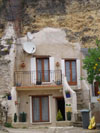 |
As you explore the
Loire
Valley
you cannot fail to notice the abundance of dwellings dug into the
slopes and rock faces of the landscape. These are referred to as
troglodytes and are the results of the local people’s desire to use
their environment to its full potential. The
tufa stone that these dwellings are cut from is soft,
manageable and easy to work, so they had the double benefit of
selling the quarried stone while creating a living or working space for
them or their
families. The troglodyte caves have the advantage of staying at a
fairly constant 12 degrees centigrade thus making them a good all year round
habitat that provided heat in winter and remained cool in summer as
well as giving good protection from the elements.
Below are a variety of examples which now form part of the areas diverse tourist attractions. There are many fine examples of troglodytes in towns and villages of the region such as Saumur, and Doue le Fontaine.
A very good
example
of this is the
Troglodyte
village
of
Rochemenier
which is in the commune
of Louresse-Rochemenier 6 km NW of
Doue-la-Fontaine, check out the links below... |
From Latin Trōglodytae, a
people said to be cave dwellers, from Greek Trōglodutai,
alteration (influenced by trōglē, hole , and
-dutai, those who enter) of
Trōgodutai. Source 'Answers.com'
Click on name or image for more detail:
|